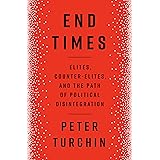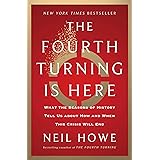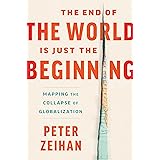
Download the free Kindle app and start reading Kindle books instantly on your smartphone, tablet, or computer - no Kindle device required.
Read instantly on your browser with Kindle for Web.
Using your mobile phone camera - scan the code below and download the Kindle app.

OK
Historical Dynamics: Why States Rise and Fall (Princeton Studies in Complexity, 8)
Purchase options and add-ons
Many historical processes are dynamic. Populations grow and decline. Empires expand and collapse. Religions spread and wither. Natural scientists have made great strides in understanding dynamical processes in the physical and biological worlds using a synthetic approach that combines mathematical modeling with statistical analyses. Taking up the problem of territorial dynamics--why some polities at certain times expand and at other times contract--this book shows that a similar research program can advance our understanding of dynamical processes in history.
Peter Turchin develops hypotheses from a wide range of social, political, economic, and demographic factors: geopolitics, factors affecting collective solidarity, dynamics of ethnic assimilation/religious conversion, and the interaction between population dynamics and sociopolitical stability. He then translates these into a spectrum of mathematical models, investigates the dynamics predicted by the models, and contrasts model predictions with empirical patterns. Turchin's highly instructive empirical tests demonstrate that certain models predict empirical patterns with a very high degree of accuracy. For instance, one model accounts for the recurrent waves of state breakdown in medieval and early modern Europe. And historical data confirm that ethno-nationalist solidarity produces an aggressively expansive state under certain conditions (such as in locations where imperial frontiers coincide with religious divides). The strength of Turchin's results suggests that the synthetic approach he advocates can significantly improve our understanding of historical dynamics.
- ISBN-100691116695
- ISBN-13978-0691116693
- PublisherPrinceton University Press
- Publication dateOctober 19, 2003
- LanguageEnglish
- Dimensions6.25 x 1 x 9.25 inches
- Print length264 pages
Books with Buzz
Discover the latest buzz-worthy books, from mysteries and romance to humor and nonfiction. Explore more
Frequently bought together

Similar items that may deliver to you quickly
Editorial Reviews
Review
"This book is clearly the state of the art in formal modeling and computer simulation of long-term historical changes in territorial states. Elegantly formulated and clearly written, it takes an important topic to a new level of formal sophistication."--Randall Collins, University of Pennsylvania
Review
"This book is clearly the state of the art in formal modeling and computer simulation of long-term historical changes in territorial states. Elegantly formulated and clearly written, it takes an important topic to a new level of formal sophistication."―Randall Collins, University of Pennsylvania
From the Inside Flap
"An important, original, and timely book--richly detailed and beautifully thought out."--Jack A. Goldstone, University of California, Davis
"This book is clearly the state of the art in formal modeling and computer simulation of long-term historical changes in territorial states. Elegantly formulated and clearly written, it takes an important topic to a new level of formal sophistication."--Randall Collins, University of Pennsylvania
From the Back Cover
"An important, original, and timely book--richly detailed and beautifully thought out."--Jack A. Goldstone, University of California, Davis
"This book is clearly the state of the art in formal modeling and computer simulation of long-term historical changes in territorial states. Elegantly formulated and clearly written, it takes an important topic to a new level of formal sophistication."--Randall Collins, University of Pennsylvania
About the Author
Product details
- Publisher : Princeton University Press (October 19, 2003)
- Language : English
- Hardcover : 264 pages
- ISBN-10 : 0691116695
- ISBN-13 : 978-0691116693
- Item Weight : 1.12 pounds
- Dimensions : 6.25 x 1 x 9.25 inches
- Best Sellers Rank: #2,511,251 in Books (See Top 100 in Books)
- #1,790 in Historiography (Books)
- #2,524 in Anthropology (Books)
- #4,117 in General Anthropology
- Customer Reviews:
About the author

Peter Turchin is complexity scientist and one of the founders of the new field of historical social science, Cliodynamics (http://peterturchin.com/cliodynamics/). His research interests lie at the intersection of social and cultural evolution, historical macrosociology, economic history and cliometrics, mathematical modeling of long-term social processes, and the construction and analysis of historical databases.
Peter Turchin is Project Leader of Social Complexity and Collapse at the Complexity Science Hub Vienna, Emeritus Professor of Evolutionary Biology at the University of Connecticut, and Research Associate in the School of Anthropology at the University of Oxford.
More information is available on http://peterturchin.com/
Customer reviews
Customer Reviews, including Product Star Ratings help customers to learn more about the product and decide whether it is the right product for them.
To calculate the overall star rating and percentage breakdown by star, we don’t use a simple average. Instead, our system considers things like how recent a review is and if the reviewer bought the item on Amazon. It also analyzed reviews to verify trustworthiness.
Learn more how customers reviews work on Amazon-
Top reviews
Top reviews from the United States
There was a problem filtering reviews right now. Please try again later.
Again a good read for those who want to learn history using the most natural approach.
I'll provide a quick overview of Turchin's work, but this synopsis doesn't do it justice; if you find my overview implausible, please read his books for yourself.
How groups manage to escape the prisoners' dilemma and cooperate is a central question of evolutionary biology. Turchin argues that the social construction of "other" along meta-ethnic frontiers (which are often defined in terms of factors other than ethnicity, in particular religion), is necessary to enable group cooperation which allows empire building. This is why empires almost invariably arise along frontiers. A ruling class with a high potential for collective action ("asabiya" - a term Turchin borrows from the 14th century political philosopher Ibn Khaldun), will expand while financing its wars by taxing the peasants. In the early days of the empire, the elite are relatively austere warriors, and low population densities allow peasants to produce a significant surplus, so elite requirements do not overburden peasant production. As population densities increase, the surplus produced per peasant decreases because each has less land, but at the same time rents charged by the elites increase as land becomes scare. Peasants become poorer, though the elite continue to do well. Wealth inequality increases, and eventually the peasant base cannot sustain the high expectations of the growing elite population. Consequently, some of the elite class find themselves without land to sustain their lifestyle, while others become extremely wealthy due to control of scarce resources. This gives rise to intra-elite conflict. Social cohesion declines due to increasing inequality, both between elite and peasant classes and within the elite. The result is that peasants who are desperate and weakened by poverty are drawn into elite infighting. A combination of civil war, famine and plague reduces the population of the weakened state. The population decline ultimately leads to lower food prices and increased wages for the poor, but the loss of social cohesion is not so easily reversed. The recovery is thus impeded by continued infighting, and sometimes an outside group with higher asabiya takes over before another expansion phrase is triggered.
Turchin has three books developing his approach. "War and Peace and War: The Life Cycles of Imperial Nations" is the popular introduction. It describes the approach without any math or equations, and applies it to a range of historical empires. This is the place to start for a general introduction, particularly if you are not mathematically inclined. However, it is not formally rigorous and will not convince you if you are sceptical. "Secular Cycles" (with Sergey Nefedov) supports the theory with quantitative empirical data. It applies the model to two cycles in each of England, France, Rome and Russia. This is the book to read if you are comfortable with numbers and need to be convinced by empirical evidence. "Historical Dynamics: Why States Rise and Fall" provides the theoretical framework, discussing, for example, why an explanation of cyclical dynamics requires a feedback loop. It is quite mathematical, and while you don't have to work your way through all the equations, you should be comfortable with mathematical models generally. Turchin's model was inspired by Jack A Goldstone, "Revolution and Rebellion in the Early Modern World." This is also an excellent book. It is written in a more traditional historical style; the model is informal, rather than formal, and the argument is supported by historical analysis of particular revolutions, rather than by quantitative data. In these respects it is similar to "War and Peace and War," though it is substantially longer. If you are looking for an extended analysis in a more traditional style of social history, this a great book.
This review pertains to all three of Turchin's books, and I am posting the same review for all of them.
It isn't often that the world sees such cross learning in one man. Usually people are
social scientists, or mathematicians or historians, but this book proves an historian can be both a
social scientist and a mathematician. I was impressed with Turchin's turning a concept:
asabiya
from an Middle eastern scholar lbn Khaldun into a differential mathematical model:
D[A,{t,1}]= c0*A*S*(1- A/h)- a
And then, using that sort of mathematical model in analytical studies of historical regions.
Those who don't take Peter Turchin's work seriously risk the fall of our culture in the near future.
List of Figures
List of Tables
Preface
Ch. 1 Statement of the Problem 1
Ch. 2 Geopolitics 9
Ch. 3 Collective Solidarity 29
Ch. 4 The Metaethnic Frontier Theory 50
Ch. 5 An Empirical Test of the Metaethnic Frontier Theory 78
Ch. 6 Ethnokinetics 94
Ch. 7 The Demographic-Structural Theory 118
Ch. 8 Secular Cycles in Population Numbers 150
Ch. 9 Case Studies 170
Ch. 10 Conclusion 197
App. A: Mathematical Appendix 205
App. B Data Summaries for the Test of the Metaethnic Frontier Theory 214
Bibliography 226
Index 243















